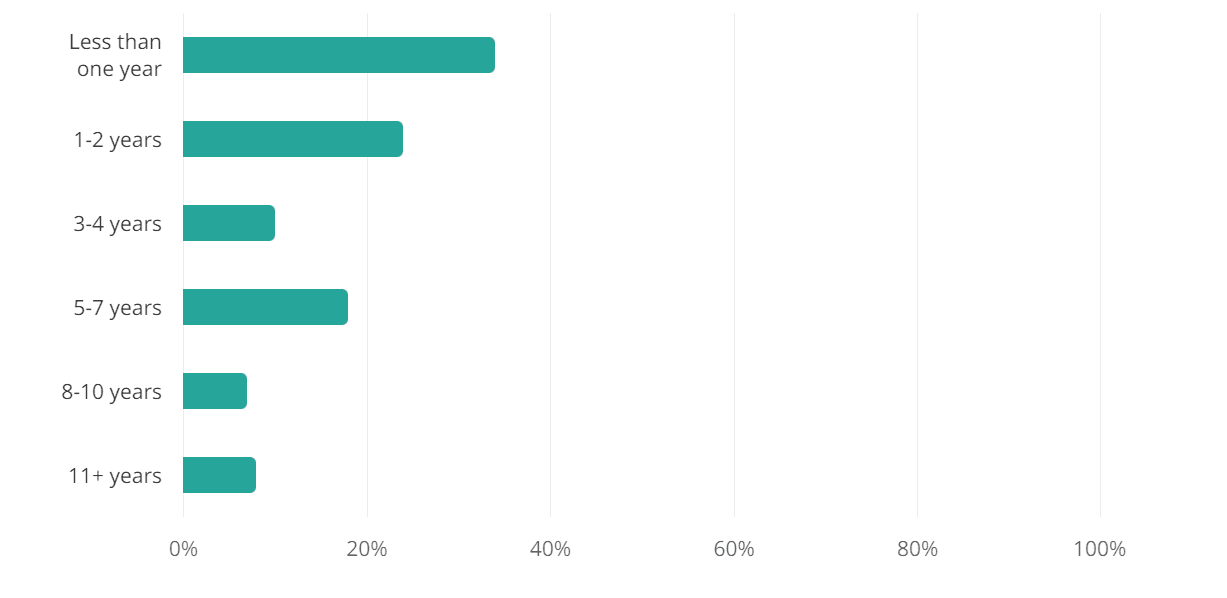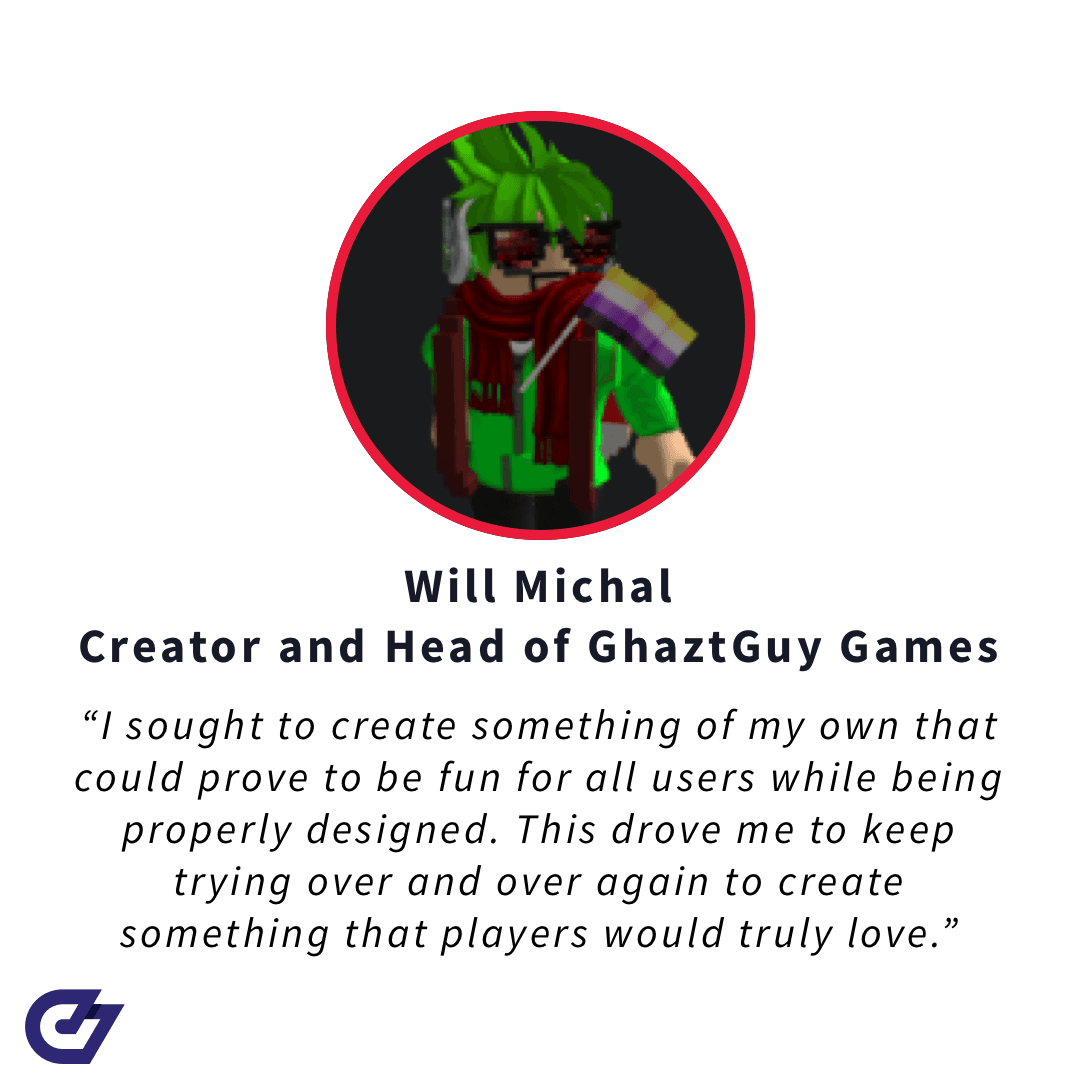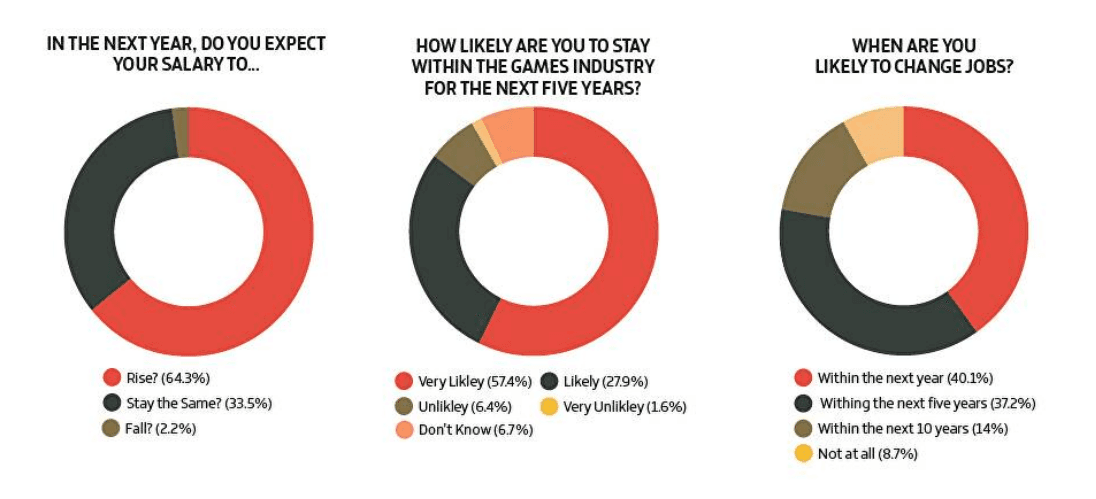
Lauren Shroll
CodeSubmit Team
Is Game Development a Dream Job?
For those who enjoy video games, the natural career choice involves exploring game development. There are many avid gamers that dream of building a game that hundreds, if not millions of users can enjoy. As one Quora user writes, there are many people "who want nothing more in life than to be game developers".
In this article, we explore the gaming industry and what factors influence the career, job outlook, and overall job satisfaction of a game developer.
What is a game developer?
In the way that driving a car is different than building a car, playing video games and creating them are entirely different. There's a huge difference between enjoying the rewards of an MMO raid and the specific traits of characters, versus designing a looting system and characters from scratch.
A game developer is a software engineer who has the job of creating a fully functioning and engaging game. They work with a number of designers, writers, animators, sound engineers, testers, and producers in their work to code, test, and maintain a game.
Typical responsibilities for a game developer might include translating storyboards and scripts into clean code, constructing the code base the game runs on, prototyping gameplay features, and creating unit tests, among many other tasks. A game developer has the chance to create games in any number of mediums, including mobile devices, PCs, and gaming consoles.
What does it take to get into the industry?
Many industry pros see game development as a calling that starts early in life with making games or other technical projects. This might involve someone tinkering with electronics and making or "modding" games in their spare time.
For example, Tim Sweeney, the CEO of Epic Games, says he spent his time deconstructing lawn mowers as early as 5 years old. The co-founder of Apple and inventor of the Apple II computer, Steve Wozniak, had his start by building electronics from scratch. In high school, he proudly developed and ran the first dial-a-joke phone service in the San Francisco Bay area.
There's a clear pattern of creativity, problem-solving, and passion for those who enter the game industry. For a hopeful game developer-to-be, how does that translate into launching their career?
Most employers will traditionally look for candidates with a bachelor's degree in software development or a similar field of study. Typical coursework covers programming languages like C++ and C#, computer 3D graphics, and game algorithms. College programs may also offer training with video game engines. All of this helps establish the technical foundation that a game developer will need on the job.
However, a degree isn't required for a career in the game industry. Like many industries, a degree doesn't promise a job. It often comes down to showcasing talent and experience. Showing proof of this to employers might include sharing a portfolio of creative projects, screenshots and videos of games, and GitHub repositories.
Other ways to break into the industry include applying for internships, participating in game design boot camps, and being active in the gaming community. Ion Hazzikostas, the Game Director at World of Warcraft, was invited to work at Blizzard Entertainment due to his experience as a Guild Master for the WoW forum, Elitist Jerks. Previously, he had been working as a lawyer in D.C.
Are game developers in demand?
The gaming industry ballooned during the coronavirus, as there was massive demand from gamers for newly released consoles and cloud gaming. The industry saw a 26% increase, reaching $191 billion. While the industry has contracted by approximately 1.6% in 2022, continued growth is expected in 2023 and beyond.
According to the U.S. Bureau of Labor Statistics, software developers, testers, and QA analysts have a projected growth of 22%, which is considered faster than average. Video game developers are included within this high-growth category.
The other factor in the demand for game developers is the high turnover rate of the industry. Zippia reviewed 1,206 resumes for game developers and found that 34% of game developers stayed at their job for less than one year. According to GamesIndustry.biz, salary and work abroad opportunities appear to be the key motivators for moving jobs.

All this results in high demand for game developers. Still, the demand for jobs by game developers joining and landing roles within the industry appears to outpace the supply of jobs. This all results in stiff competition for those applying.
Do game developers get paid well?
There's a range in pay for game developers. According to Salary.com, the average annual base pay for a game developer in the United States is $73,427.
Let's go ahead and take a look at the factors that influence a game developer's pay in the industry:
Level of Experience
First, is a game developer entry-level, junior, mid-level, or senior?
An entry-level developer fresh out of college could expect to be paid around $40,000 per year. On the other end of the spectrum, a senior developer in charge of resolving key issues is more likely to receive an annual salary of $115,000.
Role & Responsibilities
There are hundreds of potential game developer roles, which can generally be categorized as either design, art, or programming. The prior two categories lean toward being compensated slightly less than programmers, though this is not always the case.
Additionally, does the developer hold a specialized role or do they wear a number of hats?
A developer who is skilled and knowledgeable in a number of areas and coding languages tends to be paid more.
Location
Like many industries, game developer salaries vary based on location. According to ZipRecruiter, the top cities for developer pay are in California and include areas like San Jose and Santa Clara.
With the rise of remote work, how are game developer salaries affected?
In this case, it's important to consider the cost of living and developer compensation. While some companies may shift to in-person work to improve productivity, there are many companies that offer remote work. This allows game developers to make the most of their salary while living in areas with a low cost of living.
Type of Company
This is considered one of the biggest factors to affect game developer pay.
Game developers have a number of options. Developers can work for independent (or "indie") studios or be employed with larger production companies (also known as AAA).
Let's explore the difference between indie and AAA studios.
Indie studios are smaller companies that may have a handful to a few dozen people on staff. With their small size, these companies require game developers to wear multiple hats. The big perk of indie studios is that they offer more "impact-driven" work. Game developers have more say in how the game plays and the end result. For example, rather than coding a tree or car that would otherwise sit in a game environment, a developer can help conceptualize the environment itself.
Due to tight budgets and being less established, indie companies have the potential to fail, leaving game developers without a job. However, game developers may be lucky to be part of indie gaming projects that gain traction and become more well-known, such as Extremely OK Games Ltd. and their popular precision platformer game, Celeste. Or they can work on games that may later be acquired. This was the case with Mojang Studios, which most people might know for their release of Minecraft. In 2014, Minecraft was purchased by Microsoft for a cool 2.5 billion.
What about larger companies?
In comparison, AAA studios are mid-sized to enterprise studios that include big names like Blizzard, Riot Games, and Rockstar. These companies employ thousands of employees with multiple office locations worldwide. They also have budgets in the tens of millions for game development. These larger companies offer much better job stability and are more likely to provide benefits like health and dental coverage.
At a larger studio, developers have more opportunities to move up the ladder and specialize in their roles and skill sets. A larger company is also an avenue for developers to gain experience, especially if they are planning to freelance or develop their own games. However, larger companies leave little room for creative freedom. As one developer remarks in an interview with BuiltIn, developers are "a small cog in a big machine".
What are the career and working conditions like?
While the job can be truly rewarding and the pay is decent for game developers, assessing job satisfaction also involves looking at the work and hours involved, the stress developers face, and the pace of the industry.
Fast Pace
The game industry is always evolving, and players expect more in gameplay. Game developers need to keep pace with trends and sharpen their skills to stay relevant and develop quality games.
With the growing adoption of AR/VR, crypto and NFTs, and the metaverse, along with privacy updates, the gaming industry is actively seeking talent that is willing to learn, adapt, and creatively problem-solve.
Career Advancement
Success in the industry requires a lot of hard work.
According to game developer and YouTuber, Adam Bell, it's important for developers to build out their portfolios in order to advance.
He notes that a portfolio piece isn't just an hour-long project that a developer can quickly knock out in an afternoon. A developer might work an 8-10 hour workday, followed by spending 3-5 hours on a portfolio piece. Overall, portfolio pieces can often take weeks or months to complete.
Game developers also need to constantly hone and develop skills in a highly competitive job market. Shawn Warnock, an automation engineer at EA's Red Crow, recommends that game developers practice coding exercises.
Working Hours
A quick Google search of working conditions for game developers shows that "crunch time" and overwork are often viewed as the scarier aspect of the career.
In the gaming industry, overtime is referred to as "crunch". Essentially, this involves game developers working nights and weekends to meet deadlines without receiving extra compensation. This occurs when a game is set to release on a certain date, and development is behind schedule. Crunch can take place over multiple consecutive weekends and months.
The International Game Developers Association (IGDA) is an industry group that exists to advocate for game developers. In their 2019 Developer Satisfaction Survey, 40% of game developers reported working overtime or crunch at least once during the previous year. In these cases, developers worked at least 20 hours beyond a 40-hour work week! Only 8% of those surveyed reported receiving paid overtime.
For his book, Press Reset: Ruin and Recovery in the Video Game Industry, Bloomberg News reporter Jason Schreier interviewed numerous game developers. He notes that the topic of crunch time is a slippery slope since companies not only need to release a non-glitchy and functioning game, but it obviously needs to be fun for the gamer.
"That nebulous concept of ‘fun’ adds so many wrenches into the whole situation, because how do I know that this game is going to be fun? How do I know exactly how long it’s going to take before I make this game fun? How do I know whether this will be four weeks before I make it fun or eight weeks? It’s just impossible. And so all of game scheduling is just, essentially, based on educated guesses."
The future of gaming industry working conditions
Crunch has been a long-time staple of the gaming industry, mostly due to state and federal overtime law exemptions.
This has led to "crunch work" cultures that result in burnout, low morale, health issues, and drastic work-life imbalance for game developers. This becomes an even greater challenge when considering that health care and benefits are not offered to contract developers.
The reality of 50-70+ hour work weeks has fallen under more scrutiny in the last few years. The conversation became louder following Blizzard Entertainment coming under fire when information anonymously circulated about wage gaps and executive compensation.
With more focus on the toxicity in the gaming industry, hope rises for unionization. For their 2022 State of the Industry Report, IGDA ran a survey asking people if they or any of their colleagues had discussed unionization at their companies. Almost a quarter of respondents reported union talks have happened. Of those, 36% of those said their companies were supportive, with only 8% saying that companies were opposed to the idea.
So, what's happening now?
In the last year, huge progress has been made. Vodeo Games, makers of the game Beast Breaker, formed the first game worker's union in North America. By partnering with the Campaign to Organize Digital Employees (CODE-CWA), the remote team of 13 workers formed Vodeo Workers United in December of 2021. This union includes full-time employees and independent contractors in the U.S. and Canada. Workers now have bargaining power in pay and job security and are working towards introducing a four-day work week.
On May 23rd, 2022, the first union at a major U.S. video game company was voted on. Quality assurance testers at Raven Software, a subsidiary of Activision Blizzard, established the Game Workers Alliance (GWA). The alliance is currently recognized by the National Labor Relations Board (NLRB) and represents a huge milestone for the gaming industry.
In an early statement, GWA shared that “Activision Blizzard worked tirelessly to undermine our efforts to establish our union, but we persevered.” Going forward, the focus of the union's mission is to improve "the conditions of workers in the video game industry by making it a more sustainable, equitable place where transparency is paramount."
All of this marks a shift toward more widespread unionization on a global scale. Worker groups have also been formed at game studios like Paradox Interactive in Sweden and Nexon in South Korea.
“[Unions are] not a silver bullet that will fix all of the problems in the industry but [they] provide a baseline for workers to challenge exploitation.”
Are there other career path options for game developers in the industry?
Outside of the expected working environment with indie and AAA companies, game developers can freelance, meaning they pick and choose what projects to take on.
There is also the option for game developers to go out and create their own studios and games. I was fortunate to have the chance to interview a game developer who currently creates games on the Roblox platform.
Will Michal is the creator and head of GhaztGuy Games, a game studio on Roblox that has released Space Simulator, Space Simulator 2, and Space Simulator Reborn.
Will has been creating games since the age of 14. He started his journey by creating games as a hobby in Roblox Studio and has stayed with the platform since.
"Everything I learned about development with software such as Roblox Studio, Blender, and Photoshop was through trial-and-error with an occasional Google or YouTube search. Over time my hobby became more and more like a job, taking up more and more of my life."
Will's work involves UI design, 3D modeling, design, and conceptualizing for all projects, along with managing the community and social platforms for GhaztGuy Games. His coworker is in charge of scripting, coding, and functionality.

On starting a studio
There are many reasons a game developer might start a studio. In Will's case, he saw a potential opportunity to create a better gameplay experience:
"GhaztGuy Games was started because of my desire to make enjoyable experiences for others.
While I loved many games on the Roblox platform, I found myself critiquing many of the experiences and their gameplay or style. I also believed many of the games I found were either too difficult without purchases or made without overall quality in mind.
I sought to create something of my own that could prove to be fun for all users while being properly designed. This drove me to keep trying over and over again to create something that players would truly love."
The studio has steadily gained traction since its start in 2020, with Space Simulator Reborn surpassing 2 million visits following its release in July 2022. To date, the GhaztGuy Games Roblox group has amassed 291,000 members. Will and his team also manage an active Discord community with over 4,600 members.
Crunch and overtime in self-publishing games
In building out the games and managing the group, community Discord, and social channels, Will shared with me that he experiences the effect of overtime and "crunch". Leading up to his most recent game release, Will shared the struggle of balancing game development with school, seeing family and friends less, having limited free time, and sacrificing sleep.
A lot of the pressure and stress he faces comes from working to uphold his promise to players on maintaining quality and functionality:
"In my case, weekly updates that add a fair amount of content to the game are standard. Making sure everything is fully completed and in working order before the end of the week can be problematic, and fixing a bug that may have been missed after the release of an update can be even more stressful.
Late nights, rushing to finish work, and delays are nothing short of normal."
Despite this, Will told me that the reward is providing an amazing gameplay experience to his player base.
Roblox developer payout
Naturally, I wanted to know how Roblox developers and game groups (studios) were compensated.
Will shared that game developers can make money through the Developer Exchange Portal (DevEx). This allows Roblox to convert Robux (the on-site currency) into real money. In order to be part of the program, a developer needs to accumulate 50,000 or more Robux in their account.
In Roblox, game developers make money when players purchase game passes and/or developer (in-game) products. They can also get Premium Payouts, which are based on the amount of time that Premium Users spend in the game.
So, how much does a developer get paid on Roblox?
With the DevEx program, Will explained to me that Roblox takes close to a 75% cut before distributing payouts to developers. As a result, developers only see a minimal amount compared to what players spend on their games. First, Roblox takes 30% of each sale made, which doesn't include the additional sales tax. Then, the platform distributes earnings at a third of the value of Robux purchased on-site. For example, Will shares that converting 50,000 Robux would equate to $500. However, in the DevEx exchange, this amounts to $175.
Despite this, it's still very possible for game developers to earn a living and build a career through the DevEx program. The sky is the limit. Though, Will shares that payout can be highly variable from a daily or weekly basis and tends to lean higher when regular game updates are released. In this case, he says the studio makes roughly $900 per week.
He also shares the added risk of being the one in charge of pulling the strings:
"[The] risk comes from the difficulty of keeping an active player base. As the leader of a studio or series of games, you always have to be certain that your player base will enjoy the game and stick with it, otherwise they may lose interest and your sales will vanish."
Game developers can also make money through Roblox by working for Roblox game groups, like GhaztGuy Games. The type of pay varies depending on the size of the group, and the developer's rank in the group. Smaller groups tend to pay on-staff developers based on a percentage of their revenue. Larger game groups tend to provide a more stable income with hourly or weekly pay.
Is game development a passion-based job?
Developers need a strong love for what they do, due to the energy and creative thinking that's required to produce a quality game people will want to spend time playing.
On that note, some suggest game development requires more work and hours to advance and make just much as a developer role in another industry. According to a survey by GamesIndustry.biz, over 50% of respondents believed that their skills and experience would secure them better pay and working conditions in another industry.
That being said, when respondents were asked about the likelihood of continuing in the industry, 57.4% shared that it was "Very Likely" they would continue in the career.

Since Will has been developing his own games for a few years, I asked him whether or not he felt a career in game development was passion-driven.
He shared that passion is a key driver of working in the industry.
"A developer who is only money-hungry without concern for the quality of their work will not get far in the gaming industry. In other development fields (such as software development, web development, back-end development, etc.), I do believe that passion is important, but not as necessary due to the general tasks a worker performs in those certain fields."
Is being a developer a dream job?
We're back to the key question!
Being a game developer is a dream job for anyone who is passionate about software development and the gaming industry. For those who are looking to build better experiences, better games, and the new frontier of gameplay possibilities, this career is ideal.
Being a game developer means being part of a growing and exciting industry. That comes with a number of potential role possibilities and career pathways.
That being said, being a game developer involves some blood, sweat, and tears. It goes way beyond a love for video games. It requires an immense amount of work, creativity, and problem solving. It involves keeping pace with the industry and putting in the hours to make a fun and quality game for everyone. It's not the career for everyone.
The final verdict?
Will shares his take:
"To a certain degree, I believe it can be amazing to take on the role of a game developer. Being able to turn your gameplay ideas into reality is something many people could only dream of doing on a large scale. The creativity involved and the production process behind what developers do is something that has always captivated me.
However, after experiencing what it is really like, my mindset has slightly changed. Developers go through a lot more than most people expect, and even the smallest actions you perform in a game can take a team multiple hours to construct properly.
It takes a ton of time, effort, and energy out of all of them. I still believe being a game developer is an amazing job to have, but it is certainly not what most people expect it to be."